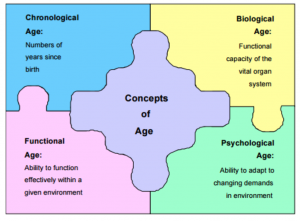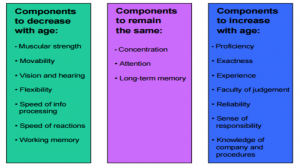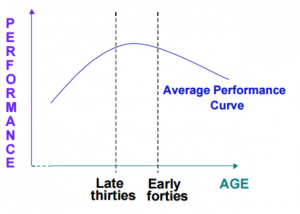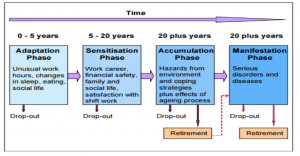58TH ANNUAL CONFERENCE, Conchal, Costa Rica, 20-24 May 2019Agenda Item: C.6.9 – WP No. 160Revision and Review on the Ageing ATCO and Retirement Age for ATCOs PolicyPresented by PLC |
Summary
The retirement age for ATCOs has been the subject of conversations in and around control rooms for many years. However, it has been over twenty years since IFATCA has addressed this issue. PLC was asked to review existing policy to see if it requires updating.
Introduction
1.1 This paper will review the policy and analyse if all, or only some, is still valid or needs to be updated.
1.2 In view of the peculiarity and uniqueness of the air traffic control profession, and in the interest of air safety, air traffic controllers should be awarded retirement at an earlier age than that of the national retirement age.
1.3 The retirement age for air traffic controllers should be determined by negotiations at a national level, taking into consideration the physical and psychological demands and occupational stress the profession involves.
1.4 Air traffic controller retirement legislation must be accompanied by an adequate superannuation scheme which enables the controller to receive pension benefits as if service had continued to national retirement age.
1.5 Ageing is a continuing process of functional changes, associated with gains and losses in functionality. Over time, a difference can be seen in a person chronologically,
biologically, psychologically, and functionally. The physiological state of the brain provides the basis for mental performance, thus reduction of one’s brain functionality can lead to reduced mental capacity.
Discussion
2.1 IFATCA TPM (2018) WC 8.5.1 (page 212) – mentions that an air traffic controller should retire earlier than the normal (for the country) retirement age.
2.2 Concepts of age :

2.3 There are many reasons why an early ATCO retirement age may be necessary.
2.3.1 The job performance is not the same as it used to be.

2.3.2 According to studies on the relationship between age and job performance of ATCOs, which was conducted by Cobb, Nelson and Mathews (1973) for the US FAA, there is a lower performance of older controllers. Performance increases until the age range of 38 to 43, decreases slightly in the age group of 44 to 49 and drops significantly after 49 years of age.

2.3.3 Shift work influences the body and the mental state – health issues.

2.3.4 Shift work has a negative impact on health: it affects the length and quality of sleep (frequently reported results are reduced sleep length and quality of sleep), induces digestive disorders, cardiovascular problems and endocrine disorders, and can cause mental imbalance often associated with general fatigue (the “shift worker’s syndrome”). Older shift workers seem to have more trouble with night- time or early morning awakenings compared to their younger colleagues who suffer more from difficulties falling asleep (De Zwart & Meijman, 1994). Older shift workers can suffer from gastrointestinal and skeletal diseases, more respiratory infections and disturbance of appetite and indigestion, and also the risk of ischaemic-related heart diseases seems to increase (De Zwart & Meijman, 1994). The negative impacts of shift work on health and well-being are compounded by ageing.
2.3.4 New technology – every day a new system is born to help us move more traffic than the day before. They say you can’t teach an old dog a new trick, but they must learn and deal with the interface issues in various ways. The human factors problems associated with the introduction of new equipment is more pronounced for older users.
2.3.5 Job demand increases every day, there are signs that keeping up with increasing traffic levels becomes more difficult with increased age . Consequently it is the cause of high time pressure constraints. To rely too strongly on experience has a risk of overlooking important new aspects of a situation.
2.3.6 Supervisors, who tend to have more seniority than younger controllers, and by association tend to be older, spend less time on position and therefore suffer from a lack of practice.
2.3.7 Speed of information decreases with age.
2.3.8 Multitasking and dealing with complexity both become more difficult with age.
2.3.9 One of the facts brought up during the survey was that in very busy centres some controllers give back their validation for certain sectors voluntarily, as they are aware of their own limits.
2.3.10 I.L.O no 4122 (I.L.O 127th session, judgement no 4122, 2 November 2018.) which review of judgment 4016 showed it doesn’t violate the general principle of non-discrimination, the tribunal also accepted that ATCOs are in different situation than other servants and the lower retirement age was justified by the specificity of their work.
2.4 Conversely, there are arguments against early retirement:
2.4.1 People live longer and the individual life expectancy has increased dramatically over the last decades. Today life expectancy in some countries is more than 80 years (NVSS Volume 67, Number 5 July 26, 2018).
2.4.2 There is no known medical evidence to support the rationale that a person may be medically fit to hold a license at 23:59 on the evening prior to their 50th or 55th or 60th birthday but be rendered unfit 1 minute later.
2.4.3 Shortage of skilled controllers and the demand is constantly increasing – due to constant increase in traffic and in demand by costumers, every day the volume of traffic is increasing and the direct effect is a higher demand for controllers to move this traffic. A higher retirement age will help retention in the system of more controllers to share the burden.
2.4.4 Medical science is evolving rapidly and advancements in the ability to detect conditions means that medical issues that may have remained hidden are now detectable and treatable, so people can get an early treatment and recover medical fitness quicker than before.
2.4.5 Competence assessments are being made frequently to ensure that required competencies are maintained. Advances in training techniques may help to overcome possible gaps in competencies.
2.4.6 Traffic growth, combined with an aging work force will see a diminution of experience levels amongst controllers over the coming years with potential safety implications.
2.4.7 Anticipation: Experienced controllers are better at anticipating, know how rapidly things can change, and know where and how problems are caused, They spot potential problems early.
2.4.8 Risk taking: elderly controllers seem to take fewer risks due to past experience and they are less adventurous.
2.4.9 Handling of unusual situations: emergencies for instance, older controllers are better in dealing with non-standard situations, They stay calm in difficult situations and they know the tricks of their job.
2.4.10 Systematic, and for operational personnel, transparent and reliable approach towards personal and career development. It is frequently regarded as a good combination to have a younger controller on the radar (executive) position and an older controller with lots of experience as a team partner on the planning (coordinator) position.
2.4.11 Retirement salary – as years go by the salary increase and if retirement takes place prior to the mandatory retirement age the ATCO can lose money, if there is no compensation, then the retirement salary will be lower. The earlier you go, the less you get.
2.4.12 According to a study (Relationship of air traffic control specialist age to Enroute operational errors, December 2005) conducted by MITRE corporation in 1977 about “performace of the human element in air traffic control” which analyzed data from 630 center and terminal errors that occurred in the years 1974 through 1976 concluded that “no age group has had neither more nor less than its proportional share of system errors” or in other words neither age group was less or more likely to be involved in an operational errors.
2.4.13 Another research conducted by Ashley Nunes and Arthur F. Kramer from Beckman Institute and Department of Psychology, University of Illinois at Urbana–Champaign about Experience-Based Mitigation of Age-Related Performance (“experience-based mitigation of age-related performance declines”: evidence from air traffic control, Ashley Nunes and Arthur f. Kramer – 2009 – journal of experimental psychology: applied 15 (2)) showed no radical differences between performance based on age.
2.4.14 In a survey conducted among 53 countries from 4 regions in 2018 The average retirement age was 61. In the survey countries been asked about the geneal retirement age and if there is a specific retirement age for ATCOs. Among other things, the results of the survey showed a trend of raising the retirement age over the years in quite a few countries.
Conclusions
3.1 There is a lack of empirical information on a recommended retirement age among ATCOs.
3.2 Most countries have not adopted or have not implemented IFATCA policy on the subject.
3.3 From a certain age ATCOs should be eligible to retire, it should be up to them to decide whether to go on an early retirement or to continue working as long as they are satisfying both the medical and the competency requirements.
Recommendations
It is recommended that:
IFATCA should, within the next five years, conduct scientific research regarding the recommended retirement age for ATCOs and review existing policy accordingly.
References
Flight Operations Panel, Montréal, Canada, May 2018. Agenda item 5.5 – Pilot age.
Eurocontrol “Age, experience and automation in European air traffic control”, 22.08.2003.
Broach, D. (May 1999). An examination of the relationship between air traffic controller age and en route operational errors.
J Exp Psychol Appl. (March 2009). Experience-Based Mitigation of Age-Related Performance.
International Labour Organization Administrative Tribunal, 127th session, judgment no.4122.
Share-project.org. (2019). The Survey of Health, Ageing and Retirement in Europe (SHARE): The retirement age rises. [online] Available at: https://www.shareproject.org/press-news/share-research-findings/new-scientific-findings/the-retirementage-rises.html [Accessed 6 Apr. 2019].
Administration, S., Research, S., Summaries, R. and Decision, R. (2019). Research Summary: Retirement Age Expectations Affect the Retirement Decision. [online] Ssa.gov. Available at: https://www.ssa.gov/policy/docs/research-summaries/ageexpectations.html [Accessed 6 Apr. 2019].


